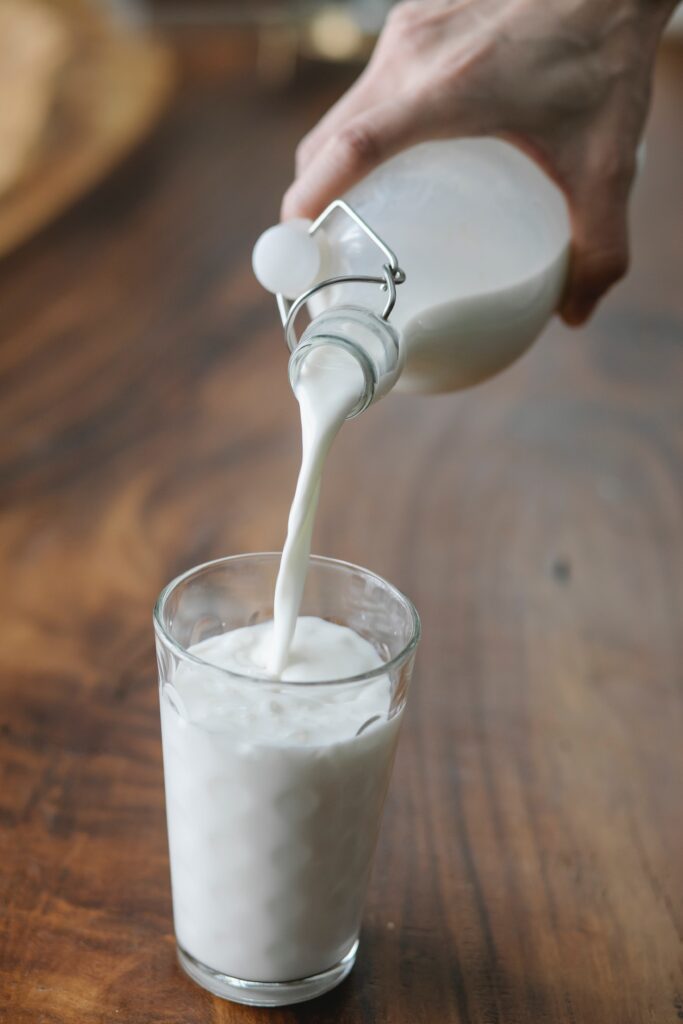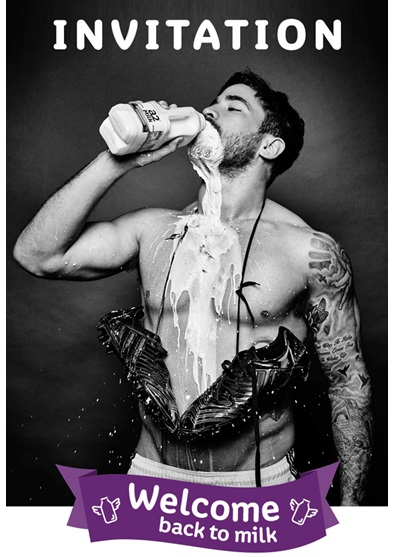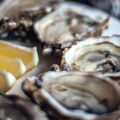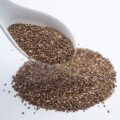On a recent visit to my father’s house in Devon, I found myself flicking through a copy of Creation magazine, which aims to proclaim and uphold the truth and authority of the bible around the world. It includes many articles about Darwin’s theories, carbon dating and lots of fascinating analysis of theories such as creationism, evolution etc. Not everyone’s cup of tea I’m sure, but one headline caught my eye – “Can’t drink milk? You’re normal!”
Milk drinkers are mutants!
For years I’ve been feeling like the odd one out, having struggled all my life with a severe allergy to all dairy, amongst other things. Here was an article proclaiming that I’m the normal one! It’s all you cheese eating, milk guzzling, cream cake chomping freaks out there who are the mutants. I leafed through the magazine to find the right page and sat back to digest these words of wisdom. This is what it said, in a nutshell.
What is the difference between lactase and lactose?
The enzyme lactase digests dairy foods by breaking down the milk sugar lactose into glucose, which the body can then absorb and use. Without this enzyme that process can’t take place. The body can’t get rid of the lactose easily so it passes into the colon undigested and there the trouble begins. The deficient person can suffer from bloating, skin rashes, diarrhoea, cramps and all manner of unpleasant side effects. This is what happens to someone with a milk intolerance.
Why can some people not drink milk?
Research has shown however that the gene for lactase normally switches off as children are weaned. A genetic mutation occurs, resulting in lactase production not being switched off, which accounts for the ability of some people to drink milk and consume dairy products into adulthood. It is estimated that 75% of adults worldwide show some decrease in lactase activity during adulthood. The frequency of decreased lactase activity ranges from as little as 5% in northern Europe, up to 71% for Sicily, to more than 90% in some African and Asian countries.
Why can milk intolerance people eat some dairy products OK?
Many lactose intolerant people can consume some dairy products, such as cheese and yoghurt without experiencing the debilitating symptoms they get after drinking milk. This is because there is less lactose in such fermented products, as the bacteria (e.g. lactobacilli) have already fermented most of the lactose in the original milk into lactic acid during production. They may also be able to tolerate Lactose free milk, which is available in most supermarkets.
Some countries have high prevalence of milk intolerance
It’s interesting to consider why some African and Asian countries have such low tolerance to dairy. They don’t tend to consume dairy in their daily diets, but they are also deficient in lactase, which means they’re normal. Not less developed and evolved than other races as some radicals believe (I would like to stress this is not my view at all).
I’m normal and you’re lactase persistent!
The article suggests a change in terminology; we should describe those who cannot digest milk as normal, instead of lactase deficient, and those who can as ‘lactase persistent’. I got a bit lost in the middle of the article with arguments about mutations, evolution, natural selection and the speed of genetic change, but the general idea that milk drinking mutants had the advantage intrigued me. It doesn’t explain why anyone gets allergies but it’s a very interesting concept.
When and why did we start drinking milk as adults?
It went on to analyse historical references such as the Holy Bible. Apparently there is no reference to milk drinking before the flood, c. 4,500 years ago, but by the time of Abraham people were certainly consuming dairy as we have references in the bible to Israel ‘being a land flowing with milk and honey’. Adam and Eve, being genetically perfect, would not have drunk milk, and therefore not had the milk drinking mutation. They would have been perfectly normal, like me! Scientists can prove that years ago our ancestors did not drink milk as we do today, so what changed?
Dairy farming and poor water sources
The western nations began to intensively farm cattle in the last few hundred years and it’s since then that the mutation began in earnest. Cow’s milk would also have been a safer source of hydration when clean water was scarce. But who was the first human that decided to milk a cow and drink it?

Should human mammals drink cow’s milk?
You only have to google “should humans drink milk?” and you get hundreds of sites discussing this very subject, but from another angle. One with very strong views is the Milk Sucks website, where they proclaim that the whole milk industry is wrong, cruel to cows and dangerous to humans. Humans are the only species which drink another animals milk, unless you count cats and hedgehogs, but left to their own devices in the wild without our intervention they wouldn’t. Why do we do this? Human babies drink their mothers milk and there are fabulous benefits including boosting their immune systems and giving them the nutrients they need to thrive but as they grow up and are weaned their lactase production will naturally switch off, or it should
Human breast milk anyone?
Here’s a question for you. Would you, as an adult, ever consider drinking human milk? It’s a bit of a taboo subject and makes me think of Little Britain and the “Bitty” sketch. Anyone who has seen that will know it’s a cringe-making performance and is just completely out of the question for us squeamish humans, even if it were available pasteurised in a bottle.
Dairy substitutes are not always healthy either
The BBC aired a programme called “Britain’s Really Disgusing Food” where Alex Riley discovered the cheap nasty dairy substitutes and the unpalatable side of milk. He tried to sell the idea of breast milk for humans to one of the leading supermarkets and it was very funny, how the woman kept a straight face I don’t know. Dairy substitutes can be so low in the plant source e.g. almond, and most consisting of water, chalk, calcium carbonate to fortify and thickeners, sweeteners and fillers that they’re not great for us.
Dairy free calcium sources
Do we need to drink milk? There is an argument that adults don’t need to drink milk at all; calcium can be found in numerous other food stuffs such as spinach, broccoli, rhubarb, almonds, oily fish like sardines and mackerel, to name just a few. These other sources contain far less calories than milk too. I and countless others who have a dairy allergy live quite happily, if with a lot of preparation, without dairy. Could you?
Can avoiding dairy cause any health problems?
If you consider that you can get all the protein and calcium in milk elsewhere in other foods, what else could be dangerous? As someone who had severe eczema and abdominal pain from cow’s milk, I cut it out to improve my health. This worked, but now I’m not able to tolerate ANY milk, and this has grown into a full blown anaphylactic allergy in adulthood. I’m not sure how anyone could avoid this, if you have a dairy allergy you HAVE to avoid dairy altogether, however my allergy was mild in the beginning. Could I have avoided future anaphylaxis by consuming small quantities throughout my life?
You can find out more about lactose intolerance on the NHS website
I would love to hear what you think about this. Should we be drinking other animals milk? Are you normal or a mutant? Please share your thoughts on this subject. I’d love to hear what you all think.












It depends how you define “normal”. In Europe, if you are part of the 95% of the population that can digest milk, your are arguably “normal”. But not if you are Chinese for example. I once read somewhere that some farming populations in Africa have are also lactose tolerant, having probably developed the mutation independently. The mutation is a survival advantage when famine occurred (due to poor harvest). In villages where they could drink milk, they would do it, sparing the cows, and they would survive. In other villages, they would slaughter the cows and finally die once they ran out of meat. These non-mutants would not leave their genes behind for future generations… It can only be a recent (<10,000 years old) mutation as it was only an advantage after farming began. I think it’s a good mutation to have! But realizing is is mostly a European trait may give you the idea of looking at Asian cuisines for example: some use no milk at all. Buying Chinese, Vietnamese, etc. cook books should give you many ideas of milk-free recipes (unless they have been “westernised”).
Hi Fred. Great comment! I think you’re right about the eating habits correlation. Coconut milk is great for cooking with and I’ve recently been in a Thai cookery course which was great, there are loads of different tasty meals to cook without dairy. In the western world you’re hard pushed to find a meal that doesn’t contain some – frustrating if you can’t eat it. So why can’t I mutate? I have never really been able to tolerate it, even since a child it used to make me sick. When I eat dairy nopw I have an anaphylactic attack. You are very lucky to be one of the 95% of mutants – but it does seem that another mutation for anaphylaxis from food is occuring more and more commonly in the Western world. What do you think is the cause of that?
Could it be our changing farming practises? In the 70’s and 80’s, when I was growing up, farmers were using all sorts of chemicals and pesticides which are now banned because they are harmful. GM food is becoming more prevalent – but is this really good for us in the long run? Are some people sensitive to these artificial introductions? I should have been born hundreds of years ago…
lol. Too late to mutate now. Although technically you could have gene therapy, which is still a long way off being appplied to allergies. No idea why anaphylaxis from food grows. But then our food is a 1000 times more varied than it was 2 centuries ago, or even 30 years ago. Especially if you count all the additives they now add. So maybe it should be no surprise.
I have felt like a mutant ever since giving up dairy products. It doesn’t help when you mention that you are lactose intolerant and people are sympathetic inline with having an arm chopped off.
I saw a program on breast milk for cancer patients a while ago, many of the cancer sufferers had no real problem consuming breast milk although not everyone felt that way. It is strange how we are quite happy to drink milk that comes from an animal that four legs, horns and goes mooo. Yet, we find the idea of drinking milk from one of our own kind as a bit off. How about daughter bitty …
http://abcnews.go.com/GMA/OnCall/story?id=7682702&page=1
Hi Kym. Thanks for the link, an interesting article. Yes I wonder why we as a race have such an issue with the thought of drinking human breast milk. Probably because we are such a race of prudes! Generally people stop breast feeding their children quite young so the child wont remember the experience. Some people still think it’s wrong for a mother to breast feed in public but it’s quite a natural thing to do, to feed your child, why would someone be offended by that? So I think it goes back to us being such prudes about our bodies, sex etc. Still, if someone passed me a glass right now I’m not sure I’d be that keen to try it ;o) I wonder whether a dairy intolerant preson would be able tolerate human milk? Has this been tested?
It depends weather the person is intolerant to lactose or cows milk protein. There is a huge difference between lactose intolerance and milk protein allergy. Human breast milk contains by far the highest amount of lactose of any mammal milk, so if a lactose intolerant adult was to drink human milk they would suffer as much if not more than they would if they drank cows milk. If the person was allergic/intolerant to cows milk protein (as I suspect you are Ruth, anaphylaxis is not a symptom of lactose intolerance but an allergic reaction to milk protein) they would react to the dairy consumed by the mother producing the milk, and therefore not be able to consume it, unless the mother was following a milk avoidance diet, in which case they would be able to consume it symptom free.
There would still be the issue that lactase is produced by the human body on a supply and demand basis, so if no lactose enters the system no lactase is produced, but in a person who has the gene this production can be switched back on by slow reintroduction of lactose in to the diet.
Living with a baby with cows milk protein allergy teaches you some very interesting facts about milk!
Milk by nature contains casomorphines which are designed to keep the calf near to the mother. Just think of the cruelty that is involved in the process whereby a cow has to give birth every year for the production of the milk to have her calf wrenched from her. Have you ever heard the bellowing? And then humans drink those casomorphines.. The implications of that are fascinating to contemplate. I’m for a low impact lifestyle. Soaking nuts and blending them seems far less all round “work” to me.
Hi Alex, only just seen your comment here. WordPress doesn’t tell me if you’ve already commented somewhere else. NO I hadn’t heard of casomorphines, nor heard the bellowing. Don’t think i want to. No Casomorphines for me please!
16 years ago I was diagnosed with celiac. in my research, i learned that milk and gluten both have an opioide molecular structure. With both milk and gluten i get severely stoned and my bowels seize up. as soon as i gave them up, my head cleared and my life became dramatically different. In a sense I spend 35 years growing up on heroin or morphine. Casomorphines.
I never knew that about milk and wheat! Fascinating. Glad you got that sorted tho. I don’t eat either due to allergy and now quite glad i don’t!
What a great blog! I am sorry it took me so long to get here, but you can bet I will be back See you on LinkedIn
See you on LinkedIn
Thank you Aunt Jayne! Great to see you here and great to find you on LinkedIn too. Make sure you subscribe to my weekly newsletter to stay up to date with what I’m rambling on about…
This is like my third time coming by your site. Regularly I do not make comments on, but I have to mention that this article really pushed me to do so. Really awesome article!
I’m 16 and recently discovered that i was lactose intolerant – which would explain all my problems for the last year or two. Since i discovered i was lactose intolerant i’ve had a bit of trouble adjusting, even sometimes missing out meals, i even felt like the odd one out, possibly the ‘mutant’.
I found your site this evening and already have found it very useful, and after reading this article, for the first time in a while i feel truly uplifted. I’ve always been a bit bizarre, the word ‘normal’ being used to discribe me even making me cringe. But for once, i love the thought of being normal.
Thank you for this site.
Kirsty! Welcome to What Allergy! Have you subscribed to the weekly newsletter? It’s free and if you do it means you’ll get reminded each week of the new stuff I’ve written about. Thank you for kind comment. I too have been where you are, I still am sometimes. I have memories of missing meals, crying looking at all the stuff in the cupboards I knew for sure would make me ill but not know what else I could eat. It does get easier. It will mean you think a lot more about what you eat and as a consequence will probably be healthier. I love it too that all those mutants THINK they’re normal, when actually they’re the real mutants! I wouldn’t call myself normal either really but I’m proud to be different. It’s taken me a while to realise that but that is the main reason I write the blog. To help others, help them realise it’s a challenge but being positive really helps. Which country do you live in Kirsty?
I haven’t yet subscribed to the news letter, but i will be soon enough.
I think being positive is probably whats stopped me from going to the shop and buying my weight in ice-cream, thinking it’ll all be better in the end.
I live in england, in the UK (:
Now you’ve got me thinking about food Kirsty! I might have to go and have some cake! Cake and ice cream do help with those positive feelings but perhaps not ones whole weight! Keep smiling!
Lactaid, the product which helps people drink milk and dairy products makes me deathly ill. Feels as if my guts are being ripped out of me. I do not know what is in it. I tried one lactose free milk product with the lactaid in it and vomited all day from it. The first time I had this reaction was ten years before that when I thought I was lactose intolerant.
Is it possible that you have milk protein allergy rather than lactose intolerance? Lactose is just the sugar that naturally occurs in milk, for you to react in that way to lactose free milk could mean that you have a milk protein allergy to either casein or whey, or even both. A milk allergy won’t alway show up on a blood or skin prick test as it can be a non IgE type allergy (or intolerance) to milk protein. He this is the case lacto free milk would not be a choice for you as it still contains milk protein.
Hi Jo
I wonder if I have the same problem. Cows milk has given me blotchy and spotty skin since puberty so when I discovered goats and sheeps milk I was happy. Beautiful, non blotchy, non spotty skin. Then I had a course of antibiotics and became ill. A nurse tole me I was lactose intolerant so I cut out all milk. My skin became better but is now very sensitive. If I have any type of anal milk now my skins gets even worse, my stomach is terrible and I get a feeling in my big toe joints like gout or arthritis. I am already gluten intolerant ( have been for about 15 years) so would love to know if I’m lactose or milk protein intolerant. There isn’t any treated goats or sheeps milk for me to test that theory. I’m not even sure I want to in case it makes me suffer again but I do miss cheese :-/
Cath, there are tests for lactose intolerance, but unfortunately there are no tests currently for diagnosing non IgE allergies, these have to be diagnosed through exclusion diet and food challenge. The problem with a lactose test is you would need to be exposed to lactose, the same way you do for a gluten test, and if you’ve been avoiding all milk products then you will naturally be lactose intolerant because it’s a supply and demand enzyme that your body only produces when it needs too :-/
There are some great cheese alternatives, never the same as the real thing but Vegusto is really close and there are a lot of different flavours to choose from, and they’re gluten free my daughter loves it, she’s only 2 and has never tasted real cheese so had nothing to compare it with, I think they are quite good, and they have won awards from FreeFromFoods.
my daughter loves it, she’s only 2 and has never tasted real cheese so had nothing to compare it with, I think they are quite good, and they have won awards from FreeFromFoods.
Hi Jo! Bit late to say this but in my last post it should have said ‘animal milk’ not ‘anal milk’!!! Hahahahaha!! It’s the iPhone keypad!!
I wish I could try Vegusto but they make it with nuts, however for anyone interested, they are experimenting making it without nuts now. So excited. And Cath you made me laugh. I got you meant animal milk but it is a rather unfortunate typo! Exclusion diets are tough but worth it, however it would mean you would have to eat the milk you fear to see if it does indeed react, in different forms. It’s worth doing, but have pain killers, antihistamines etc. on hand in case it all kicks off. Good luck and I wondered if you’d got any further in tracking down what is reacting for you?
Well Ruth, I be had some tests and they’ve shown that any reaction I’m having is non-allergic. I always knew that but I did think I was reacting to my dog and to pollens (nose). Food affects my stomach and its been determined that I have a gluten and milk intolerance. I do think I’m I diagnosed celiac but I won’t do the gluten challenge as I don’t want to feel that bad ever again or trigger other autoimmune diseases. Regarding the milk they say I’m not lactose intolerant, I’m intolerant to milk full stop, so the proteins as well as the lactose. I just think generally speaking its the proteins I’m reacting to. I react to goats milk as well as cows milk now. I miss cheese. I have challenged myself on a few occasions and the reaction isn’t worth it!
Hi Cath, glad you’ve had some success with the tests. Shame about goats milk, I could tolerate that too at first but now it’s out I’m afraid. I too miss cheese terribly… and you’re right, the reactions are not worth the pain. I did it once and ended up in A&E due to total overload. Reactions can change so always be very careful and don’t take risks. I react to the protein because lactose free stuff is totally off the cards for me. I don’t miss milk now at all. The alternatives are pretty good.
I loved this article. Well done for writing it and drawing our attention to this info. Thanks to Jo for all the informative comments too. Only just discovered your blog whilst looking for info for my two children (6months and 20months) who have multiple non-ige allergies, one being to dairy. Life is so difficult right not with picky eaters and restricted foods. I’m finding it so difficult to cook and feed them that I’m giving myself anxiety.
Hey Fari, I know it’s hard. It gets easier. Get some good cook books, there are loads out there. And keep it simple. it’s about looking at what you CAN eat, turning it on its head so there are loads of safe things in the house and really changing your eating habits. Eating out will always be a challenge but it can be done. There are some great blogs out there. Look up Dairy free baby and me and the Lunch box doctor. and also google the Intolerlant ghourmand. Good luck!